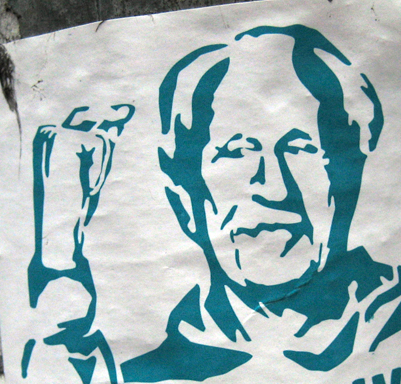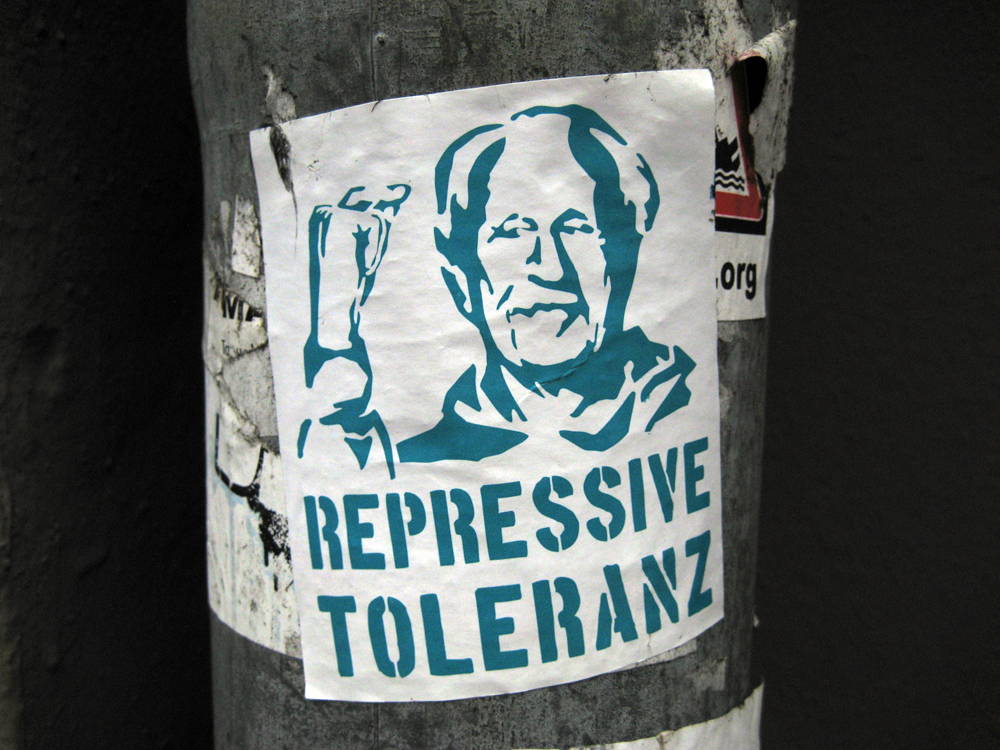Herbert Marcuse
I was fortunate enough to be able to travel to the US in Autumn 2011 to attend a fantastic conference, "Critical Refusals: The 4th Conference of the International Herbert Marcuse Society," held at the University of Pennsylvania in October 2011. Whilst this was the biennial conference of the Society, in the months leading up to the conference the Occupy Wall Street (OWS) movement rapidly spread from New York's financial district at Zuccotti Park to city occupations all around the world, and the atmosphere at the conference was significantly influenced by the presence of those radical, non-hierarchical reclamations of public space that Herbert Marcuse had theorised in the late 1960s.
After a brilliant keynote address to a packed and electric audience, the conference delegates marched with Marcuse's former student Professor Angela Davis on the two-mile journey from the Irvine Auditorium (where Marcuse had spoken at a similarly electric meeting in 1971) to Occupy Philly. As reported in the Huffington Post, Davis gave a speech to protesters using the "human mic" (you can see Angela's address to Occupy Philly on YouTube).
My paper addressed the question of eschatological temporality in Marcuse's early text Eros and Civilisation: A Philosophical Enquiry into Freud (Beacon Press, 1955). The paper has been extended into a full journal article and published in a special issue on "Marcuse After Secularism" in the quarterly American journal Telos (click here to view access options for the article), Volume 165 (Winter 2013).
See below for a preview of the green open access pre-print version of the article, or click here to download the pdf.
From Eros to Eschaton: Herbert Marcuse’s Liberation of Time
Article Abstract:
This article explores what Gershom Scholem has called Herbert Marcuse’s “unacknowledged ties to [his] Jewish heritage.” At the core of Marcuse’s vision of transformed, non-repressive social relations, I argue, is a struggle over time, which rests upon a distinctly Jewish approach to the twin questions of remembrance and redemption. One example of this approach is the temporal dialectic between alienated labor time and the timelessness of pleasure’s desire for eternity which underpins Marcuse’s analysis in Eros and Civilisation (1956). This dialectic rests upon Marcuse’s reading of the Freudian Eros-Todestrieb dualism, whose phylogenetic reading of patricide has been read by critics as reformulating the biblical rebellion against an authoritarian Yahweh.
I argue that we should read Marcuse’s privileging of the Freudian Eros-Todestrieb dualism as tacitly redefining political struggle through the affirmation of a redemptive model of cyclical time, which responds to a Jewish apocalyptic-utopian tradition. I consider the ways in which Marcuse’s later writings in such texts as “Liberation from the Affluent Society” (1968) An Essay on Liberation (1969), Five Lectures (1970) and Counter-Revolution and Revolt (1972) reveal the liberation of time to be grounded in the uncovering of nature’s “erotic cathexis.” Cyclical time thus offers Marcuse an Orphic recourse with which to confront the linear time of advanced industrial capitalism. In reading Marcuse’s delinearization of time through a reformulated understanding of Judeo-Christian eschatology, I conclude, we are afforded a fuller account of the way in which time underpins Marcuse’s appeals to utopia.
(click here to view access options for the article, published in Telos, Volume 165 [Winter 2013]).
See below for the PowerPoint slides accompanying the original conference paper:
Image by Cher Amio under a CC BY-NC-SA license.








 Dr Caroline Edwards is Senior Lecturer in Modern & Contemporary Literature at Birkbeck, University of London. Her research and teaching specialisms are in 21st century literature and critical theory, science fiction and post-apocalyptic narratives, Marxist aesthetics, and utopianism.
Dr Caroline Edwards is Senior Lecturer in Modern & Contemporary Literature at Birkbeck, University of London. Her research and teaching specialisms are in 21st century literature and critical theory, science fiction and post-apocalyptic narratives, Marxist aesthetics, and utopianism.
A "redefining political struggle (sic!) through the affirmation of a redemptive model of cyclical time"–O Dear! Sounds like "eternal recurrence" (Nietzsche) to me, in the tradition of "We Scholars". A "delinearization of time" is already an established "fact" in the execution of the economic dynamic of monopoly capitalism–Marcuse overestimated the impact of a "dwindling" economic surplus as a result of automation. Not happening. Your thesis may help in providing a deeper insight into Marcuses' "hidden motives" behind his "appeals to utopia", resting, as you state, "upon a distinctly Jewish approach to the twin questions of remembrance and redemption". Your example of a "temporal dialectic between alienated labor time (also administered "leisure time"??; or "free time"??) and the timelessness of pleasure’s desire for eternity" (and what of "timeless" Thantos and a desire to "return to the womb"?)–all of this!-certainly deserves further study. A "biblical rebellion against an authoritarian Yahweh", translates for me, living "in the hood", into a political rebellion against an absurd and exploitive social system–an "authoritarian Yahweh" objectified in the overwhelmingly oppresive economic/political dynamic …
"Abolish the Wages System"–and you "abolish" the "struggle for existance".–Utopia?
I would like to add that in my opinion, the adoption of the concept of "utopia" in Marcuse's political philosophy is the result of empirical trends in the affluent monopoly capitalist society, not the result of a Nietzschian “unacknowledged ties to [his] Jewish heritage.” In the United States today, even the idea of "full-employment" is "utopian" in light of the political implementation "from above" of austerity economics. The political dynamic and its overpowering mass media, working in the "closed universe of discourse" and class-oriented entertainment, has made unemployment appear as "natural" as the Atlantic Ocean. Marcuse saw too, as an empirical developement of class warfare, the "utopianization" of progressive ideas. These “unacknowledged" tie(s) to "Jewish heritage.” seem irrelevent and undermines his radical political intent. (Marcuse was "straight-up"!) Look at Yahoo's Homepage for example–the happy merger of US unemployment numbers, mixed with a murder/rape story, followed by the drunken antics of movies stars, new hair-dos, and leaping killer whales. Given the strength of the affluent US society, even the simplist economic goals that might impact upper class rule (like "full employment" or "universal health care") are made to seem "utopian". It appears to me that the more impotent political action becomes, the more abstract (and remote from reality) critical theory becomes……
Caroline,
I am so thrilled that this article appeared recently in TELOS! It is an important and provocative contribution, and I will be sharing it with my students and colleagues.
Warmly,
Andy
Andy,
So nice to hear from you and many thanks for the kind comments! None of this would have been possible without attending the conference. It is still the most incredible academic event I have ever attended, and I have fond memories of the delegates singing revolutionary workers' songs.
Hope all is well with you,
Caroline.
TaylorAugust 1, 2012I think Marcuse taught in University of California San Diego (UCSD) duinrg the sixties. He certainly provided a theoretical frame and an alternative to Marxism for students’ activism against the repressive tendencies of the affluent society.RESPECT.